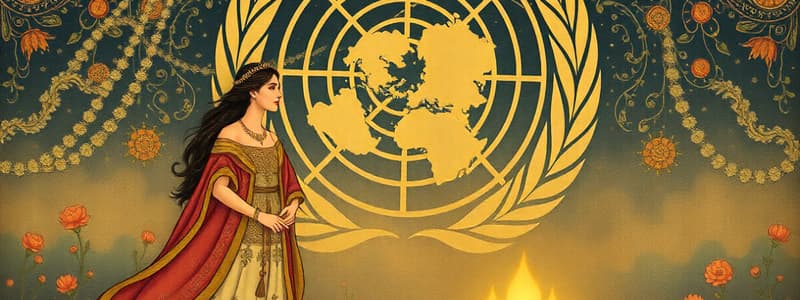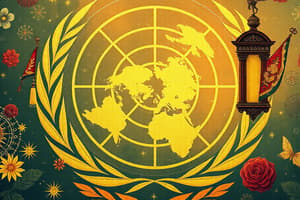Podcast
Questions and Answers
What is one of the key outcomes of the Peace of Westphalia in 1648?
What is one of the key outcomes of the Peace of Westphalia in 1648?
- Introduction of international law
- Establishment of the United Nations
- Formation of regional alliances
- Principle of sovereignty (correct)
Which body of the United Nations is responsible for maintaining international peace and security?
Which body of the United Nations is responsible for maintaining international peace and security?
- Economic and Social Council
- International Court of Justice
- Security Council (correct)
- General Assembly
What does external sovereignty refer to in the context of international relations?
What does external sovereignty refer to in the context of international relations?
- Recognition by other states as peers (correct)
- Control over international trade
- Military strength within a nation
- Influence of foreign nations on domestic policy
How many member states are there in the United Nations?
How many member states are there in the United Nations?
Internal sovereignty is best described as what?
Internal sovereignty is best described as what?
During which months does the main part of the UN General Assembly meet?
During which months does the main part of the UN General Assembly meet?
Which United Nations body serves as the principal judicial organ?
Which United Nations body serves as the principal judicial organ?
What major conflict marks the beginning of modern international relations?
What major conflict marks the beginning of modern international relations?
What role does the Secretariat of the United Nations play?
What role does the Secretariat of the United Nations play?
What event concluded the Thirty Years' War?
What event concluded the Thirty Years' War?
Which of the following actors is primarily recognized for its economic power and often viewed as a conflictual entity in international relations?
Which of the following actors is primarily recognized for its economic power and often viewed as a conflictual entity in international relations?
In the context of international relations theories, which theory considers ideational and material power as critical for understanding global politics?
In the context of international relations theories, which theory considers ideational and material power as critical for understanding global politics?
Which level of analysis primarily focuses on the interactions and behaviors of individuals within a political context?
Which level of analysis primarily focuses on the interactions and behaviors of individuals within a political context?
According to realism, what is the most significant variable that determines international relations?
According to realism, what is the most significant variable that determines international relations?
Which of the following theories is characterized as optimistic regarding the possibility of change in international politics?
Which of the following theories is characterized as optimistic regarding the possibility of change in international politics?
Which of the following accurately describes the nature of politics as perceived by historical materialism?
Which of the following accurately describes the nature of politics as perceived by historical materialism?
What is the primary focus of the international organizations within international relations?
What is the primary focus of the international organizations within international relations?
Which actor in the international system is often characterized by its non-state status and significant social influence?
Which actor in the international system is often characterized by its non-state status and significant social influence?
What level of analysis considers interactions that occur between different nation-states?
What level of analysis considers interactions that occur between different nation-states?
According to liberalism, which aspect is not viewed as a central variable in understanding international relations?
According to liberalism, which aspect is not viewed as a central variable in understanding international relations?
What was a primary goal of the Congress of Vienna?
What was a primary goal of the Congress of Vienna?
Which statement best describes the Balance of Power Process?
Which statement best describes the Balance of Power Process?
What is the primary purpose of theory in the context of international relations?
What is the primary purpose of theory in the context of international relations?
Which factor is considered when developing multiple theories in International Relations?
Which factor is considered when developing multiple theories in International Relations?
Which of the following best defines assumptions in theories?
Which of the following best defines assumptions in theories?
Which outcome did the Congress of Vienna aim to achieve among European powers?
Which outcome did the Congress of Vienna aim to achieve among European powers?
What role do variables play in theories of international relations?
What role do variables play in theories of international relations?
What significant event did the Congress of Vienna seek to address following the Napoleonic Wars?
What significant event did the Congress of Vienna seek to address following the Napoleonic Wars?
How did the concept of Theory emerge as important in international relations?
How did the concept of Theory emerge as important in international relations?
Which of the following groups were involved in World War I?
Which of the following groups were involved in World War I?
Flashcards are hidden until you start studying
Study Notes
United Nations Bodies
- The United Nations has six main bodies
- Security Council
- General Assembly
- Economic and Social Council
- Secretariat (Secretary-General)
- International Court of Justice
- Trusteeship Council
- The UN has 193 Member States
- The Assembly meets in New York every year
- The main portion of the Assembly is held in September to December
- The resumed portion is held from January to September.
- The 79th session (1945+79=2024) of the United Nations General Assembly started in 2023
- The Holy See and the State of Palestine are observers to the UN.
- The UN Web TV provides information on the sessions
The Thirty Years’ War and the Peace of Westphalia
- The Thirty Years’ War in Europe (1618–1648) is considered the origin of modern international relations.
- The Peace of Westphalia in 1648:
- established the principle of sovereignty.
- solidified the political rights of monarchs
- laid the foundation for the formation of the modern nation-state.
Sovereignty
- Internal Sovereignty: The effective use of force within a country's borders.
- External Sovereignty: Recognition by other states as an equal.
Congress of Vienna (1814–1815)
- The Congress of Vienna was a multi-lateral meeting held in 1814–1815 to reorganize the European political landscape.
- The goal was to re-establish the old monarchies and redistribute power among European countries
- The Congress of Vienna aimed to create a balance of powers in Europe to maintain peace.
Balance of Power
- If a country becomes a rising and threatening power,
other countries should seek to balance the power by:
- Increasing their own military power
- Creating alliances with other concerned nations
- The Balance of Power Process is the mechanism used to oppose a rising threat by forming alliances.
- The Congress of Vienna maintained a relative peace among major European powers until 1914.
World War I (1914–1918)
- Germany, Austria-Hungary, and the Ottoman Empire fought against the Allies (Great Britain, U.S.A., France, Russia, Italy, Japan, and other smaller powers)
- More than 9 million soldiers and 40 million people lost their lives.
World War II (1939-1945)
- Approximately 3% of the world population died
- Between 70 and 85 million people died
What is Theory?
- Theory is a generalization that simplifies reality by focusing on only the most important variables.
- Theory is an analytical tool designed to predict and control events.
Uses of Theory
- Describe: Provides an overview of ideas, concepts, events or actions.
- Explain: Explains why the outcome of an event occurred based on the theory.
- Predict: Uses the theory to anticipate future events or outcomes.
- Control: Attempts to control future events or outcomes.
- All theories have assumptions and variables:
- Assumptions are predetermined by the author.
- Variables indicate the essential information that the theory considers.
Theories of International Relations
- There are multiple theories of international relations
because scholars seek to answer different questions:
- Who are the main actors?
- What is the most important variable?
- What is the nature of politics?
- Is change possible?
- What is the level of analysis?
Main Actors in the International System
- Nation-States
- International Organizations
- Multinational Corporations (MNC)
- Non-governmental Organizations (NGO)
- Non-state Actors:
- Individual leaders
- Terrorist groups
- Famous individuals
Levels of Analysis
- Levels of analysis seek to explain international
relations (for example, the Ukraine War) by examining
different dimensions:
- Global Level: examines the whole system.
- Interstate Level: examines interactions between two or more states.
- Domestic Level: examines internal factors within states.
- Individual Level: examines the actions of specific individuals.
Theories of International Relations Summary
- Five main theories of International Relations:
- Realism
- Liberalism
- Constructivism
- Historical Materialism
- Feminism
Main Actor Main Variables Nature of Politics Possibility of Change? Level of Analysis
- Realism States Military Power Conflictual Pessimistic Interstate
- Liberalism States and Other Actors Economic Power, Political Ideologies Cooperative Optimistic Global, Interstate, Domestic, Individual
- Constructivism States and Other Actors Ideational & Material Power Conflictual & Cooperative Optimistic Global, Interstate, Domestic
- Historical Materialism Economic Classes, Material Power Conflictual Optimistic Global
Studying That Suits You
Use AI to generate personalized quizzes and flashcards to suit your learning preferences.




